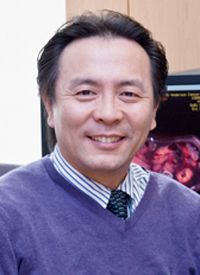JCAR017 Being Explored in Non-Hodgkin Lymphoma
CAR T-cell therapies are now expanding into all areas of hematologic malignancies, including non-Hodgkin lymphoma, after demonstrating early success in acute lymphoblastic leukemia. JCAR017 is chief among these agents.
Michael Wang, MD

Michael Wang, MD
CAR T-cell therapies are now expanding into all areas of hematologic malignancies, including non-Hodgkin lymphoma, after demonstrating early success in acute lymphoblastic leukemia. JCAR017 is chief among these agents, with a multicenter phase I study currently looking at the CD19-targeted therapy for patients with relapsed/refractory diffuse large B-cell lymphoma (DLBCL), primary mediastinal B-cell lymphoma (PMBCL), follicular lymphoma Grade 3B, and mantle cell lymphoma (MCL).
This phase I study, also known as TRANSCEND, is currently enrolling across the United States, with many of the top institutions in the country participating. The trial is ongoing at the MD Anderson Cancer Center and the Memorial Sloan Kettering Cancer Center, which are number 1 and 2 on the US News & World Report rankings. The agent has made its way into the clinical trial listing for these major institutions based on its efficacy and early demonstration of safety. Moreover, the prospect of treating non-Hodgkin lymphoma is appealing to experts in the field.
"I am impressed with the safety profile of this trial product," noted the lead investigator at MD Anderson Cancer Center, Michael Wang, MD. "I look forward to treating more patients with not only large cell but also mantle cell lymphoma." Wang is a professor in the Department of Lymphoma & Myeloma.
Early results from the phase I study were presented by Jeremy S. Abramson, MD, at the 2016 ASH Annual Meeting. Abramson is from the Massachusetts General Hospital Cancer Center, which is another of the top institutions enrolling participants.
In the early results, JCAR017 demonstrated a 60% complete response (CR) rate in patients with relapsed or refractory CD19-positive non-Hodgkin lymphoma. The overall response rate (ORR) with the lowest dose of the therapy was 80%. In 27 efficacy-evaluable patients treated across doses, the ORR was 78%, with a CR rate of 52%. CRs were seen in patients with double- and triple-hit lymphoma and for 1 patient with CNS disease. After 3 months of follow-up, 42% of assessable patients remained in response.
"Thus far, JCAR017 is producing encouraging overall and complete response rates in highly chemotherapy-refractory diffuse large B-cell lymphoma, for which no current standard therapy exists," Abramson, said when presenting the results. "More time is needed to see how durable these remissions prove, but thus far a number of responding patients continue in ongoing remission at limited follow-up."
Of note, there were fewer adverse events (AEs) seen with JCAR017 compared with other CD19-targeted CAR T-cell therapies. None of the enrolled patients experienced severe cytokine release syndrome (CRS), which is known to plague CAR T-cell therapies. Thirty-six percent of patients had grade 1/2 CRS and just 1 participant required treatment with tocilizumab. Additionally, 5 patients (14%) had severe neurotoxicity, all of which resolved with treatment.
The most common all-grade treatment-emergent AEs across all patients and dose (N = 28) were fatigue (39%), CRS (36%), decreased appetite (29%), constipation (25%), vomiting (25%), diarrhea (21%), dizziness (21%), headache (18%), hypertension (18%), nausea (18%), and peripheral edema (18%). There was 1 grade 5 respiratory failure in a patient with MCL who progressed on JCAR017 and had begun subsequent therapy. This was deemed to be potentially related to JCAR017.
Four patients required treatment with dexamethasone and 1 received tocilizumab. No patients were treated with vasopressors and anti-epileptics were initiated for 1 patients with CNS lymphoma and for 5 experiencing neurotoxicity symptoms.
"The toxicity profile has been notable for low rates of both cytokine release syndrome and neurotoxicity, with no cases of severe cytokine release syndrome observed to date, and all cases of CRS and neurotoxicity being reversible," Abramson noted.
The TRANSCEND trial continues to recruit patients with NHL, with a target enrollment of 144 (NCT02631044). A phase II study will be opened soon to continue to assess JCAR017 for patients with relapse/refractory DLBCL.
In the early results, those with chemorefractory DLBCL (n = 16) had an ORR of 75%, which included a CR rate of 56%. Overall, 2 patients had double-hit, 3 had triple-hit, and 4 had double-expresser DLBCL. Within this group of 9 patients with aggressive subtypes, there were 7 CRs and 2 PRs.
In addition to JCAR017, the CAR T-cell therapy JCAR014 is also being developed for non-Hodgkin lymphoma. There is an early study currently enrolling that is exploring this agent with the PD-L1 inhibitor durvalumab. This trial is exclusively being conducted in Seattle at the Fred Hutchinson Cancer Research Center (NCT02706405).
Reference:
Abramson JS, Palomba L, Gordon LI, et al. Transcend NHL 001: Immunotherapy with the CD19-Directed CAR T-Cell Product JCAR017 Results in High Complete Response Rates in Relapsed or Refractory B-Cell Non-Hodgkin Lymphoma. Presented at: 58th American Society of Hematology Annual Meeting; San Diego, CA; December 3-6, 2016. Abstract 4192.
Gholam Contrasts Lenvatinib With Other Options in Child-Pugh B HCC
December 21st 2024During a Case-Based Roundtable® event, Pierre Gholam, MD, discussed how post hoc and real-world analyses build upon the limited available trial data for treating patients with unresectable hepatocellular carcinoma with Child-Pugh B status.
Read More
Navigating ESR1 Mutations in HR-Positive Breast Cancer With Dr Wander
October 31st 2024In this episode of Targeted Talks, Seth Wander, MD, PhD, discusses the clinical importance of ESR1 mutations in HR-positive metastatic breast cancer and how these mutations influence treatment approaches.
Listen